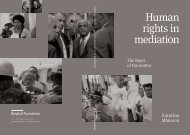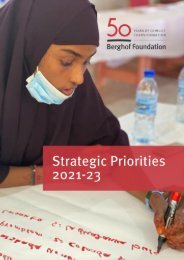Berghof Foundation: 50 years of conflict transformation
This book provides an overview of the Berghof Foundation’s work and impact over the past 50 years and sheds light on the challenges ahead of peacebuilding.
This book provides an overview of the Berghof Foundation’s work and impact over the past 50 years and sheds light on the challenges ahead of peacebuilding.
Create successful ePaper yourself
Turn your PDF publications into a flip-book with our unique Google optimized e-Paper software.
Georg Zundel<br />
Founder <strong>of</strong> the<br />
<strong>Bergh<strong>of</strong></strong> <strong>Foundation</strong><br />
A life<br />
for peace<br />
The book you are holding in your hands provides<br />
an overview <strong>of</strong> the <strong>Bergh<strong>of</strong></strong> <strong>Foundation</strong>’s work and<br />
impact over the past <strong>50</strong> <strong>years</strong>. However, none <strong>of</strong> it<br />
would have been possible without the vision, courage<br />
and generous support <strong>of</strong> our founder, Pr<strong>of</strong>. Dr. Georg<br />
Zundel. He established the <strong>Bergh<strong>of</strong></strong> <strong>Foundation</strong> in<br />
1971 and enabled us to grow and continue our work<br />
also after his passing in 2007. This book is dedicated<br />
to him.<br />
Born in Tübingen, Germany, on 17 May 1931,<br />
Georg Zundel was confronted from an early age with<br />
an environment which would shape his convictions<br />
and ideals and ignited a passion for the three themes<br />
that would remain central to him throughout his life —<br />
peace, the sciences, and agriculture and forestry.<br />
It was his parental home and the political<br />
developments during his childhood and adolescence<br />
that were particularly formative for Georg Zundel.<br />
He was brought up in a political household at the<br />
<strong>Bergh<strong>of</strong></strong>, an Art Nouveau country house that his<br />
parents, the painter and farmer Georg Friedrich Zundel<br />
and Paula Bosch, had built on the edge <strong>of</strong> Schönbuch<br />
forest, overlooking the university town <strong>of</strong> Tübingen.<br />
Intellectual and physical work characterised life at<br />
the <strong>Bergh<strong>of</strong></strong>, where Georg Zundel soon developed an<br />
understanding <strong>of</strong> the social and political tensions <strong>of</strong><br />
the time and learned to appreciate nature and the<br />
value <strong>of</strong> agriculture.<br />
The rural idyll <strong>of</strong> the <strong>Bergh<strong>of</strong></strong>, which was<br />
to lend its name to many <strong>of</strong> Georg Zundel’s later<br />
ventures, stood in stark contrast to the horrors that<br />
were about to unfold in Germany. The experience <strong>of</strong><br />
totalitarianism and the terrors <strong>of</strong> the Second World<br />
War left a deep mark on Georg Zundel and instilled<br />
in him a deep conviction that led him to continue the<br />
political and pacifist tradition <strong>of</strong> his grandfather,<br />
renowned German entrepreneur Robert Bosch,<br />
and his father’s first wife, Clara Zetkin, a women’s<br />
rights activist and socialist politician.<br />
In his memoirs, Georg Zundel wrote:<br />
“The violent confrontation <strong>of</strong> the Second World<br />
War [...] resulted in my resistance to rearmament,<br />
my involvement in the anti-nuclear movement and<br />
finally the establishment <strong>of</strong> the <strong>Bergh<strong>of</strong></strong> <strong>Foundation</strong><br />
for Conflict Research. [...] Our youth today lacks<br />
such experiences. It therefore seems to me to be<br />
<strong>of</strong> the utmost importance to raise awareness <strong>of</strong><br />
the <strong>conflict</strong>s smoldering in society and to work out<br />
strategies that will make it possible to resolve these<br />
<strong>conflict</strong>s peacefully.”<br />
He actively opposed the rearmament <strong>of</strong> the<br />
Federal Republic <strong>of</strong> Germany in 1949 and took part<br />
in protests against the arming <strong>of</strong> the German military<br />
with nuclear weapons in the <strong>years</strong> 1958 to 1961. As<br />
the founder <strong>of</strong> the <strong>Bergh<strong>of</strong></strong> <strong>Foundation</strong>, he became<br />
“the most important private promoter <strong>of</strong> peace<br />
and <strong>conflict</strong> research in Germany,” as his longtime<br />
colleague, fellow peace researcher Reiner Steinweg,<br />
wrote in his obituary. In 2003, Georg Zundel’s<br />
commitment to peace was honoured with the Grand<br />
Cross <strong>of</strong> the Order <strong>of</strong> Merit <strong>of</strong> the Federal Republic<br />
<strong>of</strong> Germany.<br />
Beyond his passionate commitment<br />
to peace, Georg Zundel pursued a successful<br />
career as a scientist. A trained physicist known<br />
for his contribution to the field <strong>of</strong> hydrogen bond<br />
research, he had a thirst for scientific discovery<br />
that transcended boundaries and whose aim was<br />
the practical application <strong>of</strong> research results. To that<br />
end, he founded the <strong>Bergh<strong>of</strong></strong> Group, a technology<br />
company and innovation hub, which celebrated its<br />
<strong>50</strong>th anniversary five <strong>years</strong> ago. In accordance with<br />
his pacifist ideals, he would not allow the company<br />
to carry out any research or development in the<br />
armaments sector. Georg Zundel was pr<strong>of</strong>oundly<br />
convinced that natural sciences, innovation and<br />
business shared a strong social responsibility to<br />
serve humanity. This responsibility extended to<br />
scientists themselves, who in his view were obliged<br />
to consider the ethical implications <strong>of</strong> their work.<br />
At the same time, he was strongly attracted to a<br />
universalistic understanding <strong>of</strong> science across<br />
political divides, which he actively pursued by<br />
building strong and <strong>of</strong>ten personal links to scientists<br />
in the Soviet Union and Poland. Natural sciences,<br />
business and ethics were inseparable to Georg<br />
Zundel; in that sense, he was clearly ahead <strong>of</strong><br />
his time.<br />
A central part <strong>of</strong> his belief in thinking beyond<br />
disciplinary boundaries and always keeping the<br />
greater good in mind was his attempt to build bridges<br />
between the natural sciences and peace work. While<br />
this did not always meet with a positive response in<br />
the early <strong>years</strong> <strong>of</strong> the <strong>Bergh<strong>of</strong></strong> <strong>Foundation</strong>’s existence,<br />
it is today more relevant than ever. In light <strong>of</strong> the<br />
immense challenges that climate change poses to<br />
peace, finding scientifically sound ways <strong>of</strong> integrating<br />
the latest findings <strong>of</strong> climate change research into<br />
peace work is not only a strategic priority for the<br />
<strong>Bergh<strong>of</strong></strong> <strong>Foundation</strong> but also the best way to honour<br />
our founder’s legacy.<br />
10<br />
11










